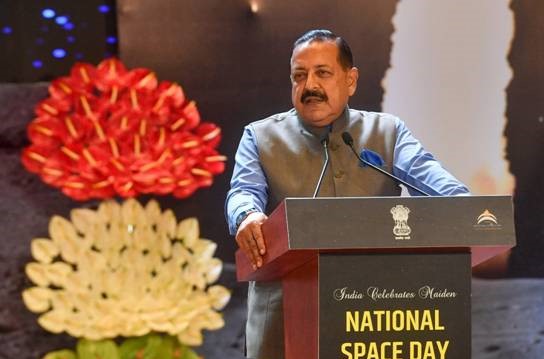New Delhi: In a historic celebration of India’s space achievements, Union Minister of State (Independent Charge) for Science and Technology, Dr. Jitendra Singh, made a landmark announcement today: an Indian astronaut will land on the Moon by 2040. This bold vision was revealed during the first-ever National Space Day, held at Bharat Mandapam, with President of India Droupadi Murmu in attendance.
Addressing the nation, Dr. Singh lauded India’s recent space triumphs, including the successful landing of Chandrayaan-3 on the Moon’s South Pole in 2023—a feat that captured global attention and firmly established India as a leader in space exploration. “In the last six decades, India has not only touched the lives of its citizens but also reached the Moon,” he said.
The event, themed “Touching Lives while Touching the Moon: India’s Space Saga,” celebrated the country’s remarkable space journey. Dr. Singh recounted Prime Minister Narendra Modi’s declaration that August 23rd would be commemorated annually as National Space Day, and the Chandrayaan-3 landing site would be named ‘Shiv Shakti Point.’
Highlighting India’s space accomplishments, Dr. Singh traced the country’s progress from humble beginnings in 1969, when the United States had already landed on the Moon. From then, India has surged ahead, with landmark missions like the Mars Orbiter Mission, AstroSat, and the Chandrayaan and upcoming Aditya-L1 solar missions. Dr. Singh credited Prime Minister Modi’s leadership and policy support since 2014 for accelerating scientific advancements and transforming India’s space sector.
The Minister also hailed the boom in space startups, with nearly 300 emerging since the sector was opened to private participation. This expansion, combined with government support, is projected to propel India’s space economy from $8 billion to $44 billion in the next decade. He praised Prime Minister Modi for making space exploration accessible to the public, citing the Chandrayaan-3 launch, which was witnessed live by over 5,000 spectators and nearly 1,000 media personnel at Sriharikota.
Looking toward the future, Dr. Singh outlined the Space Vision 2047, which includes the establishment of the Bharatiya Antariksha Station (BAS) by 2035 and Indian astronauts landing on the Moon by 2040. The plan envisions expanding India’s space capabilities, starting with human spaceflight in Low Earth Orbit and advancing to lunar exploration and beyond.
India’s self-reliance in space was a key point of Dr. Singh’s address. He highlighted the nation’s comprehensive capabilities in space transportation, platforms, and ground stations, which enable India to be a global leader in space technology. He also emphasized the broader impact of space applications on key sectors such as fisheries, agriculture, disaster management, and satellite communications.
As India embarks on its next chapter in space exploration, Dr. Singh expressed confidence that National Space Day will inspire greater awareness and enthusiasm among citizens, fueling the country’s journey toward new frontiers in space.





